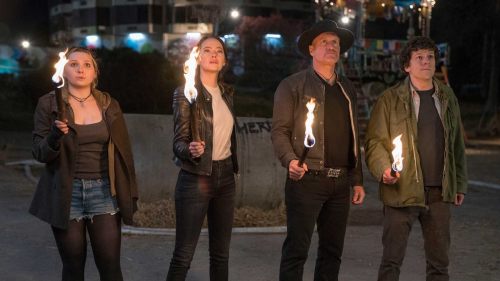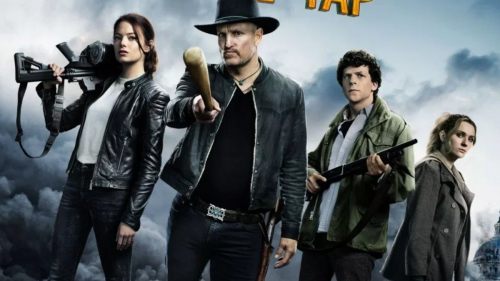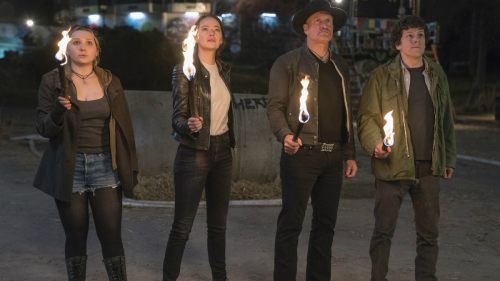Fantasia 2019 Review: THE ART OF SELF-DEFENSE Kicks Toxic Masculinity With Its Fist
You see masculinity depicted onscreen a lot. Like, a lot a lot. Usually, it’s celebrated, whether through punchy-kicky action setpieces or stoic one-man-holds-in-his-tears dramas. Recently, we’ve seen the concept dissected a bit more frequently - but never before as hilariously as this. In The Art of Self-Defense, Faults writer-director Riley Stearns has lovingly crafted an exquisitely absurd satire of toxic masculinity. Small but perfectly formed, it’s one of the funniest movies of the year, cutting straight to the heart of YouTube-era neo-misogyny.
Jesse Eisenberg stars as Casey Davies, a scrawny, Dachshund-owning accountant who’s got a masculinity problem. Specifically, he has none of it, but desperately craves it - especially after a gang of motorcyclists beat him nearly to death. In order to plaster over his trauma and gain some assertiveness, he enrols in a karate school - but the enigmatic Sensei (Alessandro Nivola) may push him further towards manhood than he foresaw.
Within minutes, it becomes clear that The Art of Self-Defense doesn’t quite take place in our world. It takes place in a world even more hyper-masculinised than our own: where radio broadcasts make regular friendly suggestions of carrying guns, where men’s magazines are simple catalogues of boob pictures, and where answering machines take an exasperated tone with their owners. Stearns’ dialogue often intentionally overexplains characters’ thought processes, exposing their inherent ridiculousness, and his camera stands back as a quiet observer. It’s fantastic.
This continues into the karate school, where most of the movie takes place. The Art of Self-Defense paints a deliberately cartoonish picture of karate and karate culture, magnifying its sense of self-importance and its reverence toward hand-to-hand violence. Casey’s path through the school - topping out at yellow belt, the second-lowest level, around which he obsessively builds his new identity - is hilarious and sad, in the way that men buying bulk lots of penis-enlargement pills is hilarious and sad. His overcorrection towards masculinity turns him into an equally awkward funhouse-mirror version of himself, so manly that he refuses to pat his dog lest it become too “coddled.”
"Pain is weakness leaving the body" has nothing on the macho bullshit found here.
As the film progresses, the comedy turns considerably darker. Story developments push the tone toward a far more pointed and savage takedown of toxic masculinity than the playful first half would suggest. Though the twists aren’t necessarily shocking - and don’t even really surprise the characters, deep down - they’re extremely uncomfortable to watch. We laugh even as we squirm, as Casey starts (with Sensei’s encouragement) to lose control of his emotions. For those familiar with the parlance of Men’s-Rights Assholes, there are plentiful jokes at their worldview’s expense.
No comedy this nuanced could ever succeed without absolute consistency in the cast, and Stearns marshals his cast to subtle and uniformly excellent comic performances. Eisenberg makes possibly the best-ever use of his nerdy physique here, amplifying both Casey's initial timidity and the ludicrous, terrifying nature of his more masculine self. Imogen Poots, as the sole female member of the karate class, communicates a fierce compassion underneath her machismo-calloused exterior. And Nivola, in a magnificent deadpan turn, is equally magnetic and repulsive as the charismatic asshole Sensei. The entire cast, from leading roles to bit parts, is on the same page, helping the script sing.
Many people have compared The Art of Self-Defense to Fight Club, and it’s easy to see the similarities on the surface. Both follow dweeby office slaves along their paths to masculine self-actualisation. Both feature heavily-violent secret clubs with strict rules. Neither has more than one notable female character. But where Fight Club falls victim to its own indulgence in the very ideas it’s trying to satirise, The Art of Self-Defense keeps its sights fixated on its thematic mission. Dudebros won’t be championing this movie as a celebration of Man Culture; every scene either openly mocks it or specifically illustrates it as destructive. What's more, the violence in the film is specifically targeted at helpless or near-helpless individuals. For a movie centred on karate, there aren’t really many fights - just beatings - and it’s all the better for it.
Not everyone will jam as hard on The Art of Self-Defense as I did. It’s a profoundly strange movie at times, and viewers who insist upon believable character motivations will be left wanting. But this movie exists in a heightened state of absurdity - all the better to deliver both its terrific jokes, and its commentary on strength, weakness, and the perception thereof. It’ll punch a hole in your face, and only laughter will come out.



